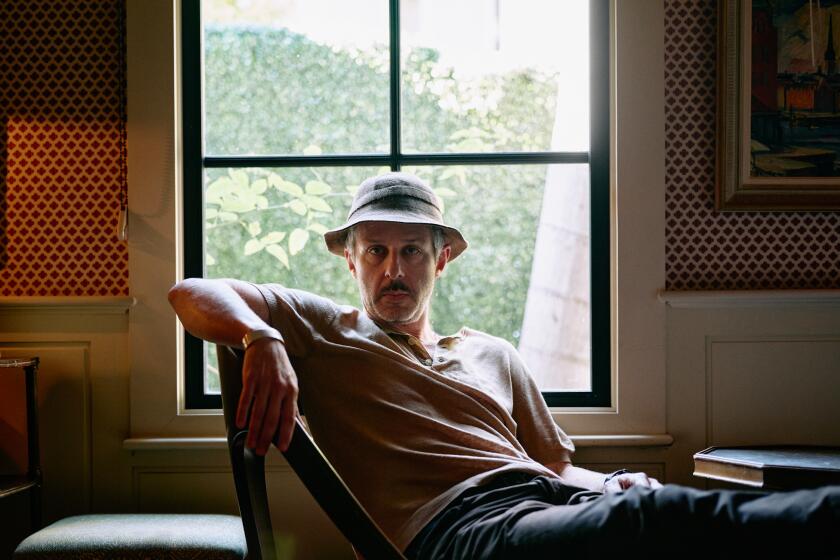In the Age of Terrorism
PALM SPRINGS — The roiling geopolitical caldron is the raison d’etre for an international filmmakers’ caucus to be held Saturday at the Palm Springs International Film Festival as directors, writers and actors hash over the last year’s events and discuss how they’ve affected the business and their art.
The caucus will substitute this year for the festival’s customary international filmmakers’ panel, said festival program director Jennifer Stark. The panel gave filmmakers a forum to discuss their workaday problems, but Stark said it gave way this year to larger ruminations on the moral implications of making movies in unsettled times.
So, as the festival plays at venues around town--featuring 160 films from 60 countries through Jan. 21--filmmakers are ruminating on that, and on the always capricious American audience.
“I make films to illuminate the human condition,” said Indian director Mira Nair, in town for a screening of her “Monsoon Wedding,” a poignant, often funny story about family members’ secrets coming to light during a traditional Punjabi wedding. “I have people from Southern California telling me my film is about their families.”
Such experiences point up a striking fact for many foreign filmmakers: how much America has learned about being a member of the global community since Sept. 11.
“Americans are being forced to grow up,” Nair said. “You are insular in many ways. There is so much demonization of ‘the other,’ but now you are realizing that you are part of the other.”
“There has been a big change in audiences everywhere,” said Belgian actor Carlo Ferrante, who is attending the festival.
“They seem to be more introspective,” Ferrante said. “They are more willing to examine deep subjects ... even in a movie like “Amelie,” people want romance, a chance to dream. We want to believe that anything is possible.”
His reference to Jean-Pierre Jeunet’s romantic comedy points up perhaps the key dilemma: whether and how deeply to delve into lightheartedness when so many social issues seem so urgent.
Confirmed participants in Saturday’s caucus include directors Monika Treut, “Warrior of Light” (Germany); Matej Minac, “The Power of Good” (Czech Republic); Juan Vera, “Son of the Bride” (Argentina); Arpad Sopsits, “Abandoned” (Hungary); Danis Tanovic, “No Man’s Land” (Bosnia); and Gil Portes, “Bosom of the Enemy” (Philippines).
Stark, who is assembling the roster for Saturday’s caucus, said that in some ways, the festival reminds her of working in the press office at the Toronto International Film Festival during the height of the Bosnian War.
“We had filmmakers from Lithuania, Yugoslavia, Bosnia, Macedonia, around the table ... and it was interesting to see how they dealt with how their countries and cultures were being ripped apart and as filmmakers how that affected them,” Stark said.
*
One of the most successful recent films about Bosnia, “No Man’s Land,” an Oscar submission from Bosnia for best foreign language film, spryly weaves ironic levity into a story about the Bosnian War. Tanovic drew inspiration from the death and destruction that raged around him.
“For one thing, any war is absurd. I think any killing of any humans is just absurd.... I’m a pacifist in that regard.”
“No Man’s Land” tries to strike a tone of black comedy and irony to balance the dread and apprehension. “Making a film like this, it’s walking on the blades,” said Tanovic. “I could easily fall into theater, into comedy, which was not something I wanted. I could fall into pathetic [tone], also what I did not want.”
Hardly a tougher subject exists than the plight of Afghans, the subject of a festival entry from Iran, “Baran,” a humanistic treatment of a young Iranian construction worker’s romance with a young Afghan refugee.
“I tried to inject a lot of optimism ... and also there is a good bit of humor in it,” producer-director Majid Majidi said through a translator. “But when you make a movie about the Afghani situation, and the circumstances the refugees live under, it’s a grim situation. And I did my best not to make a grim film, but it’s a grim subject.”
Some movie-makers at the festival think that the world--apart from the neighborhoods where bullets and bombs are dodged--might be ready for a new era of escapism.
After Sept. 11, “the whole industry was a big question mark. Some of the foreign market didn’t have any buyers at all because nobody knew what their countries would want,” said David Albert Pierce, co-executive producer of “Symphony of Silence,” the Armenian submission for the foreign film Oscar.
“Now people want entertaining diversions from reality, and Hollywood has always provided the source of that,” Pierce said, as he headed off to a screening of “Symphony,” a drama with comic undertones about an escaped mental patient who emigrates to America, makes his fortune and returns home to buy the hospital where he’d been held.
“I think the films are displaying a little more humanity ... about the way they depict violence and mass destruction, but if you take a look at the films gearing up for production, people always have a taste for ability to separate fiction from reality.”
*
The Palm Springs International Film Festival continues through Jan. 21. The International Filmmakers’ Caucus is scheduled for Saturday at noon at a location to be announced. For information, call (760) 322-2930. The festival Web site is www.psfilmfest.org.
More to Read
Only good movies
Get the Indie Focus newsletter, Mark Olsen's weekly guide to the world of cinema.
You may occasionally receive promotional content from the Los Angeles Times.










